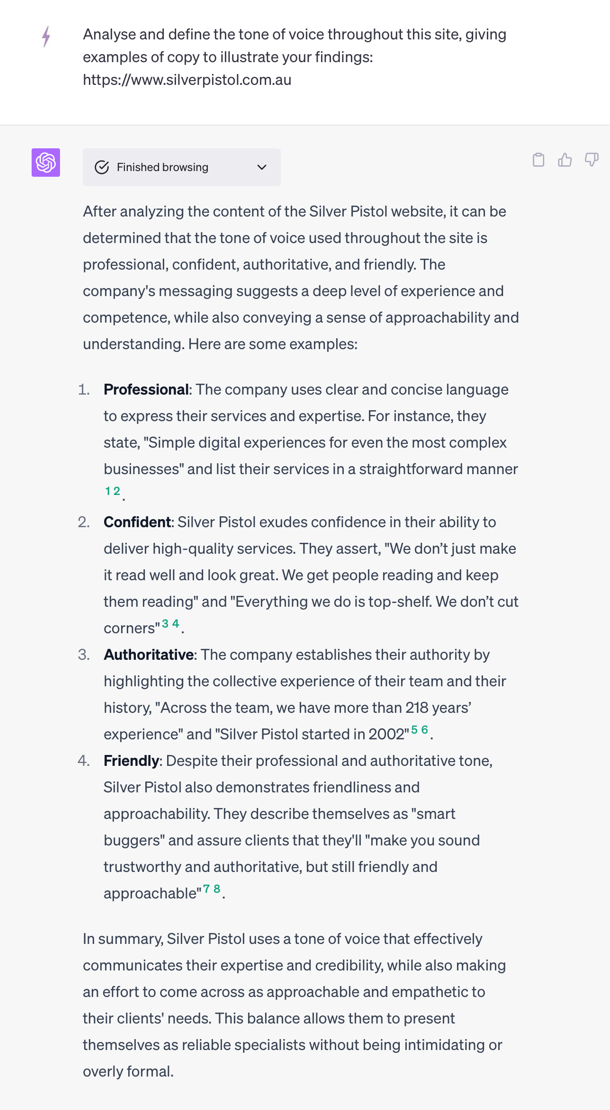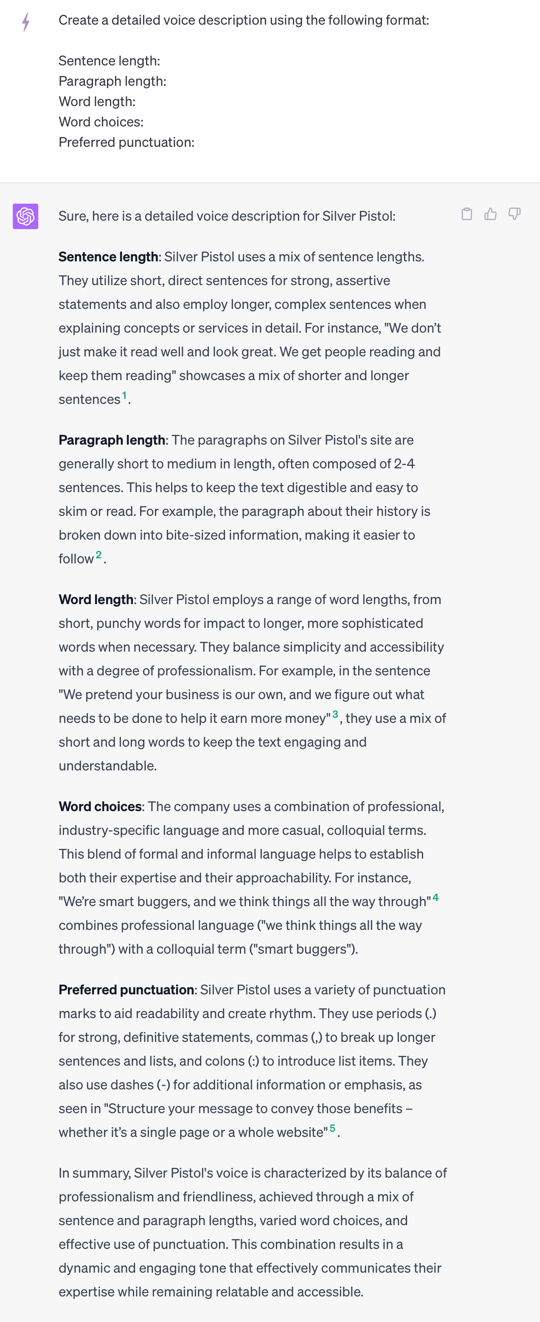Why aren’t I as excited about ChatGPT as you? An interview with copywriter and AI-enthusiast, Ami Williamson.
May 26, 2023 • Glenn Murray

I’m all for new-fangled toys. Just ask my wife how many hours I’ve wasted invested researching the latest and greatest phone, Chromebook, bicycle handlebars, project management tool, waterproof jacket or media streaming set-top device. Or toaster. (You should SEE my toaster!)
So neither my wife nor I were at all surprised when, back in December ‘22, I was heartily distracted by Marques Brownlee’s video about this shiny new AI doowacky, called ChatGPT.
Nor were we surprised when I spent many hours over the ensuing months experimenting with various ways I could put that doowacky to use, and arguing conversing with it about the nature of humanity. Or when I wrote a very long blog post, back in April, encouraging copywriters to use ChatGPT, and explaining how (in great detail).
But after five months of regular ChatGPT use, I have to be honest and admit my excitement has waned. And just when everyone else seems to be losing their shit about it!
Don’t get me wrong; I still use it, and I still stand by everything I’ve written. I still think it can be good for quickly distilling information, getting your head around new subject matter, and spotting the grey areas that you should be writing about. I just don’t think it has a helluva lot more to offer in the day-to-day life of a good copywriter, let alone a good UX designer.
I thought, for a while, my dwindling enthusiasm was due to all my grey hairs. That, maybe, at 50, I’m simply too old to appreciate the opportunity. But then my Nan told me I’m still a spring-chicken, so it definitely can’t be that!
Which leaves me at a bit of a loss. Why is everyone else so hot for ChatGPT, when I’m, at best, only luke-warm?
Fortunately, this isn’t a question I have to ponder by myself any longer. Because today, I’m interviewing one of Australia’s hottest up-and-coming copywriters, owner of copywriting agency Damn Write and self-confessed AI fan-girl, Ami Williamson.
So grab a cuppa and get ready to witness an old dog learning a few new tricks, because Ami’s about to edumacate me!
Glenn: Ami, thanks for taking the time to help me understand what I’m missing when it comes to ChatGPT. Before we jump into my re-education, though, I’d like to cover a little bit about you, and why my readers should be paying very close attention to your words of wisdom. Can you tell us a little about yourself, your background and your work?
Ami: Sure thing Glenn, and good on ya for being open to a bit of brain-reshuffling. So I’ve been writing copy for nearly 7 years now, and you can find my words on supermarket shelves, product packaging and even painted on walls — not to mention websites and emails and all the other digital stuff we work on.
But if that doesn’t quite make me worth paying attention to, maybe the existential threat of AI does…
Glenn: I heard you on a US podcast, AI for Creative Entrepreneurs, talking about how you use ChatGPT for your brand voice work. Can you tell us a little about how that actually looks in practice?
Ami: Absolutely. ChatGPT is my sounding board at every stage of a project — which includes defining a brand’s distinct voice, of course.
In practice that often looks like getting ChatGPT to analyse on-brand copy (provided by the client), so that I have that in-depth voice description to work with. If a brand doesn’t have copy that they’re happy with the tone of, or we’re starting from scratch, I’ll use ChatGPT to tease out a more distinct tone of voice based on things like the brand personality and the audience (pieces I also use ChatGPT to help me with).

It’s also helped me dig deeper than the typical wishy-washy voice descriptions we’re all used to working with. Instead it forces me to get into the specifics of what that voice sounds like for that particular brand, along with how and where that tone shows up. How does the copy flow? What words are they using that convey that tone? What punctuation do they use? And what do they avoid? All pieces of the voice puzzle — ones that the client, AI and myself can better understand.

Glenn: And you’re using ChatGPT 4, right? The latest version?
Ami: Yep. The cost of a ChatGPT Plus subscription (which gives you access to 4 — and now to web access and plugins) is a steal compared to how much I get out of it. Even with the terrible exchange rate.
Glenn: I asked ChatGPT 4 to read some of my copy, and then to summarise and remember my ‘voice’. I thought it did a good job of describing my voice, and it was able to remember (i.e. label) it so we could refer to it as ‘Glenn’s voice’ in future discussions. But then I asked it to read the copy of some random, blah article off the internet, and I thought it was way too charitable in its description of the qualities of that author’s voice. It felt a bit like Oprah reading a horoscope. “YOU get a great horoscope, and YOU get a great horoscope, and YOU get a great horoscope.” Then when I asked it to rewrite that blah article in my voice, it didn’t do a great job. What do you think I did wrong here?
Ami: Chances are you didn’t do anything wrong, your expectations might just be a little lofty. GPT-4 is infinitely better than the previous versions, but it’s still early days. I’ve also noticed it seems to default to a positive view in general, which isn’t always the right approach and can feel kinda jarring.
But it’s not ambiguous horoscope levels of bad. If I have enough detail in my voice description (ie. specifying how certain tones show up) and I give it the key points of what I want it to say (so it’s not left to fall back on its own rose-coloured view of the world), I find I can get decent first drafts from it. From there it’s usually about slightly tweaking the language or the structure, maybe adding a transition that feels more natural. It can also be easier to spot what doesn’t feel right, and build from that, then to start from scratch.
Glenn: Given how much ChatGPT helps with your voice of customer (VOC) work, how much time it saves you, and how you can basically rewrite entire pieces of copy in the customer’s voice in mere seconds, don’t you worry your customers might just to decide to cut out the middleman and use ChatGPT to do the same thing you are?
Ami: Can I tell you a terribly kept secret? It doesn’t really save me time, at least not yet. And I’m more focused on using it to improve my work, and the thinking behind it, than to save time.
But you’re right. And if someone wants to learn how to use it to do the research, the strategy, the ideation and to then write their own copy — I’ll be the first one to offer to show them how. A huge part of why I’m fangirling over AI is because I can see the opportunity to make the art of communication more accessible.
But as I mentioned in that podcast, I also think it’s about maybe letting clients fail. Let them give it a go, and if they get frustrated by its limitations, they don’t have the years of knowledge and experience we bring or they find their copy doesn’t perform all that well, then chances are they’ll come back to us with a better appreciation for this whole copywriting thing we do. We’re no strangers to being undervalued and it’s not all that different to a client trying to write something by themselves before giving up.
Glenn: Gotcha! That makes a lot of sense. I suppose that kinda explains why I haven’t seen how it will help me much, day to day. I don’t typically get asked to write simple articles or to ‘polish’ existing copy. My clients tend to want entire websites. They come to me with only a vague idea of what they want their website to say, and how they want it to look and behave. Often they can’t even summarise what it is that they do. I then spend hours talking to them, understanding their needs, goals, pain points, customers, competitors, etc., and their customers’ needs, goals and pain points. Then I plan a user experience and write web copy that not only accurately describes my client’s products or services, but which also meets all of those needs, goals, pain points, etc. ChatGPT hasn’t helped me at all with any of this, so far, and it sounds like you’re saying it can’t?
Ami: Well, yes and no. I agree that all that hidden work that goes into writing something that “sounds good” and gets the results a client wants — ChatGPT can’t do this itself, nor can it help as much as we do it. (Incidentally, it’s that work that sets us apart from the non-copywriters who give it a go, too.)
But AI can be used to make that work easier, faster and better too. I’ll use it to uncover key themes, pain points, objections and whatever else is sitting in a sometimes gigantic pile of VOC data — work that would easily take hours before, with the risk of me missing something crucial hidden in there.
I don’t outsource my thinking to AI, but I do use it to broaden it. So I’ll still go over the client’s intake questionnaire and pull out the relevant bits and scribble down my own thoughts and ideas… and then I’ll play around with those ideas in AI to see where the gaps are in my thinking, to find approaches that might not have otherwise occurred to me.
I think there’s also a tendency to overestimate our human abilities while harshly critiquing AI. To think it’ll never ever ever in a million years be able to do what we can. But I’m not so sure. There are already AI tools dedicated to VOC analysis. What happens if there’s a specific tool that helps that client turn their vague idea into something tangible, something they can communicate… and it does it faster and cheaper than one of us could?
And unless the advances slow down, pinning our hopes on the limitations of current AI is setting ourselves up for some potentially painful realisations later on.
Glenn: That’s a pretty scary prospect! What can we creatives do to mitigate the risk?
Ami: It’s a prospect that plays on my mind a lot, and one that I don’t think anyone can give you a foolproof plan for. For me, it’s about leaning on my years of knowledge and experience, sharpening my skillset, and then not sticking my head in the sand and pretending AI isn’t a thing. I could see it leading to more value being placed on the ideas behind the writing — something a good copywriter already spends time on and can give more nuanced guidance on than AI.
For now curiosity, creativity and hope keep me going (maybe because the alternative isn’t super motivating).
Glenn: I’ve come to much the same conclusion. Specifically, I’m seeing how creative I can get with generative AI. By that, I don’t mean I’m trying to write poetry or screenplays, but that I’m thinking outside the square about what I can use it for, and what sorts of instructions I can give it. In doing so, I’ve used ChatGPT (3 and 4) on free and paid accounts, Google’s Bard and Bing Chat. GPT 4 was definitely better than the others for me. What about you?
Ami: Similar experience here. It didn’t take long with either Bing or Bard to run into blatantly false info — something that seems less common in GPT-4. I’m curious to see how well Bard works once it’s rolled into the Google Suite products though. If it’s even close to GPT-4, having it available in a Doc or Sheet will make a huge difference.
Glenn: Have you looked much at Google’s upcoming AI search results? A lot of SEOs seem to be worried about them, but they seem to me to be kinda like featured snippets on steroids. It doesn’t look like they’ll distance searchers from the source websites at all. In fact, Google says it wants to encourage searchers to dig deeper into those sites. I think the real question is around information reliability. Because the AI’s response is more like a person’s summary, I think it will be perceived as more reliable (credible, authoritative) than the excerpts from 10 third party websites. Google says it will identify and display high-quality, reliable sources that corroborate the information presented, but I wonder if that will be enough. Has Google just created a tool that will spread misinformation even faster?
Ami: I have looked at Google’s upcoming AI search results, and I think it’s important to remember that Google has probably been dragged into the AI arena a little sooner than they were planning for.
Based on what I’ve seen so far (which is those featured snippet sections being replaced with interactive AI-generated results), my money would be on it reducing website click throughs. Because if the AI works well (it’s a big “if”, but stay with me here), why would a user want to click through to most likely static site that might not even solve their problem? But as I’m sure you’re very aware, predicting user behaviour is a bit like planning your life around horoscopes.
Oh, and I’m not sold on the idea of the information being more reliable, but having sources linked in a step in the right direction.
I guess we’ll see once it rolls out.
Glenn: Yeah, someone said the same thing to me on Twitter recently: That searchers won’t dig deeper than the AI answer. But I think it depends on what information they’re looking for. If they want answers to simple questions, sure, it’s more a brand awareness exercise. But if they have complex needs, AI can’t help much, and they’ll want to click through. Likewise, I think if the searcher is after a human perspective on something, they’ll end up clicking through (assuming they understand that the AI generated answers are AI generated!). And if their search query is just a starting point to discover a service provider, product or product vendor, I think they’ll click through. Basically, I think searchers will basically do what they do now, after reading a featured snippet.
That said, I do think the AI answers will often be better than the featured snippet answers we see now, and I think we’ll start to see AI answers where we don’t currently see featured snippets. As a result, I think any sites that currently make money off transactional answers to relatively simple questions are going to suffer. But sites that make money by providing sophisticated answers to very complex questions, or expert solutions to tricky problems, those sites will continue to make money.
Anyway, Ami, thanks so much for your time today. You’ve certainly given me a lot to think about, and I trust my readers have learned just as much from you as I have!
Ami: Thanks for the chat. I’m always keen to talk about this stuff, and I’m glad I was able to shed some light on things for you and your readers.
What do you think?
What do you think? How will AI help and harm your business? Please comment below.

